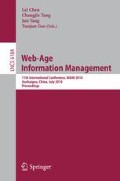Abstract
Existing research efforts in sentiment analysis of online user reviews mainly focus on extracting features (such as quality and price) of products/services and classifying users’ sentiments into semantic orientations (such as positive, negative or neutral). However, few of them take the strength of user sentiments into consideration, which is particularly important in measuring the overall quality of products/services. Intuitively, different reviews for the same feature should have quite different sentiment strength, even though they may express the same polarity of sentiment. This paper presents an approach to estimating the sentiment strength of user reviews according to the strength of adverbs and adjectives expressed by users in their opinion phrases. Experimental result on a hotel review dataset in Chinese shows that the proposed approach is effective in the task of sentiment classification and achieves a good performance on a multi-scale evaluation.
Access this chapter
Tax calculation will be finalised at checkout
Purchases are for personal use only
Preview
Unable to display preview. Download preview PDF.
References
Pang, B., Lee, L.: Opinion Mining and Sentiment Analysis. Foundations and Trends in Information Retrieval 2(1-2), 1–135 (2008)
Turney, P.D.: Thumbs up or Thumbs down? Semantic Orientation Applied to Unsupervised Classification of Reviews. In: 40th Annual Meeting of the Association for Computational Linguistics, pp. 417–424 (2002)
Hatzivassiloglou, V., Wiebe, J.M.: Effects of Adjective Orientation and Gradability on Sentence Subjective. In: 18th International Conference on Computational Linguistics, pp. 299–305 (2000)
Wiebe, J.M.: Learning Subjective Adjectives from Corpora. In: 17th National Conference on Artificial Intelligence, pp. 735–740 (2000)
Hu, M., Liu, B.: Mining and Summarizing Customer reviews. In: 10th ACM SIGKDD Conference on Knowledge Discovery and Data Mining, pp. 168–177 (2004)
Hu, M., Liu, B.: Mining opinion features in customer reviews. In: 19th National Conference on Artificial Intellgience, pp. 755–760 (2004)
Agrawal, R., Srikant, R.: Fast Algorithm for Mining Association Rules in Large Database. In: 20th International Conference on Very Large Data Bases, pp. 487–499 (1994)
Fellbaum, C.: WordNet: an Electronic Lexical Database. MIT Press, Cambridge (1998)
Pang, B., Lee, L., Vaithyanathan, S.: Thumbs up? Sentiment Classification using Machine Learning Techniques. In: 7th Conference on Empirical Methods in Natural Language Processing, pp. 79–86 (2002)
Cui, H., Mittal, V., Datar, M.: Comparative experiments on sentiment classification for online product reviews. In: 21st National Conference on Artificial Intelligence, pp. 1265–1270 (2006)
Dave, K., Lawrence, S., Pennock, D.M.: Mining the Peanut Gallery: Opinion Extraction and Semantic Classification of Product Reviews. In: 12th International World Wide Web Conference, pp. 519–528 (2003)
Esuli, A., Sebastiani, F.: Determining Term Subjectivity and Term Orientation for Opinion Mining. In: 11th Conference of the European Chapter of the Association of Computational Linguistics, pp. 193–200 (2006)
Wilson, T., Wiebe, J., Hoffmann, P.: Recognizing Contextual Polarity in Phrase-level Sentiment Analysis. In: Conference on Human Language Technology and Empirical Methods in Natural Language Processing, pp. 347–354 (2005)
Zagibalov, T., Carroll, J.: Unsupervised Classification of Sentiment and Objectivity in Chinese text. In: 3rd International Joint Conference on Natural Language Processing, pp. 304–311 (2008)
Pang, B., Lee, L.: Seeing Stars: Exploiting Class Relationships for Sentiment Categorization with Respect to Rating Scales. In: 43rd Annual Meeting of the Association for Computational Linguistics, pp. 115–124 (2005)
Snyder, B., Barzilay, R.: Multiple Aspect Ranking using the Good Grief Algorithm. In: Annual Conference of the North American Chapter of the Association for Computational Linguistics, pp. 300–307 (2007)
Williams, G.K., Anand, S.S.: Predicting the Polarity of Adjecives Using Wordnet. In: 3rd International AAAI Conference on Weblogs and Social Media, pp. 346–349 (2009)
Zhang, H., Wang, M., Lv, Z., Zhang, X.: Institute of Computing Technology, Chinese Lexical Analysis System: ICTCLAS 3.0, http://ictclas.org
Zhang, J., Tang, J., Li, J.Z.: Expert Finding in a Social Network, In: 12th International Conference on Database Systems for Advanced Application, pp. 1066–1069 (2007)
Felzenszwalb, P.F., Huttenlocher, D.P.: Efficient Belief Propagation for Early Vision. International Journal of Computer Vision 70(1), 41–54 (2006)
Author information
Authors and Affiliations
Editor information
Editors and Affiliations
Rights and permissions
Copyright information
© 2010 Springer-Verlag Berlin Heidelberg
About this paper
Cite this paper
Lu, Y., Kong, X., Quan, X., Liu, W., Xu, Y. (2010). Exploring the Sentiment Strength of User Reviews. In: Chen, L., Tang, C., Yang, J., Gao, Y. (eds) Web-Age Information Management. WAIM 2010. Lecture Notes in Computer Science, vol 6184. Springer, Berlin, Heidelberg. https://doi.org/10.1007/978-3-642-14246-8_46
Download citation
DOI: https://doi.org/10.1007/978-3-642-14246-8_46
Publisher Name: Springer, Berlin, Heidelberg
Print ISBN: 978-3-642-14245-1
Online ISBN: 978-3-642-14246-8
eBook Packages: Computer ScienceComputer Science (R0)

